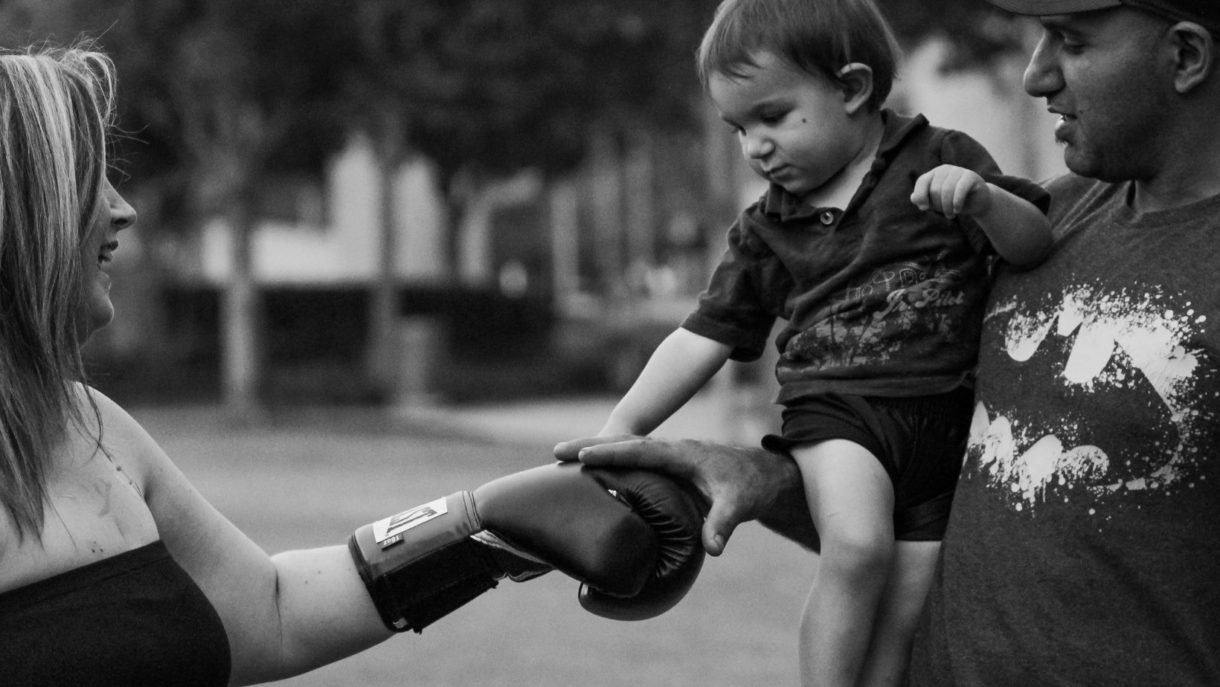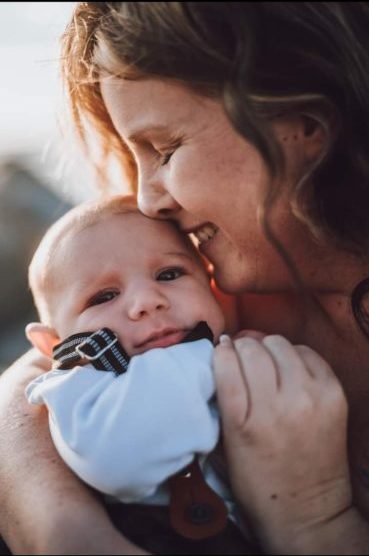Featured Survivor Story:
Motherhood and Melanoma: Raleigh Minning, Stage III Melanoma Survivor

By Mara Klecker
One of the only times Raleigh Minning cried during her melanoma journey was when she thought of the possibility that her newborn son may not have memories of her if the disease took her life.
She’d just undergone a full lymph node dissection—only weeks after giving birth—and was still trying to nurse and pump milk for her baby, despite painful lymphedema in her breast. Her husband and mother had to help her physically lift baby Atticus to Raleigh’s chest to nurse.
“It was a very vulnerable time,” she said.
 Then came the infection, one that caused her temperature to spike to a dangerous level. She stayed in the hospital for a week and still continued pumping, alternating between ice and heat packs to ease the pain. Her husband was taking the milk home and storing it, but she didn’t realize he was feeding the baby formula instead out of precaution. He was concerned about what antibiotics she was on and if it could affect Atticus. When she returned home from the hospital, she found all the milk she’d worked so hard to pump and ended up having to throw it out.
Then came the infection, one that caused her temperature to spike to a dangerous level. She stayed in the hospital for a week and still continued pumping, alternating between ice and heat packs to ease the pain. Her husband was taking the milk home and storing it, but she didn’t realize he was feeding the baby formula instead out of precaution. He was concerned about what antibiotics she was on and if it could affect Atticus. When she returned home from the hospital, she found all the milk she’d worked so hard to pump and ended up having to throw it out.
“That was the moment for me,” she said. “It was like ‘OK, I can’t nurse my baby anymore. I am a cancer patient. I can’t even lift my own baby.”
Raleigh’s initial diagnosis in October 2018 was staged at pT1a, or Stage IA She underwent a wide local excision and figured she had little more to worry about other than routine skin exams. Then, at 34 weeks pregnant with Atticus, Raleigh felt a golf ball-sized lump in her armpit.
“I immediately knew that the cancer was back,” she said. That was November 2019.
She had an OBGYN appointment the next day and her doctor sent her for a biopsy and ultrasound right away. Raleigh’s melanoma had spread superficially and was now at Stage IIIC.
“I think the OBGYN was in disbelief too, because it’s not something she was that familiar with,” Raleigh said. It was the first of many times she realized how little is known about melanoma and pregnancy.
Indeed, Dr. Isabella Glitza, a melanoma medical oncologist at M.D. Anderson Cancer Center who is currently gathering data from pregnant melanoma patients all over the world, says there’s very little data available yet about how pregnancy impacts melanoma.
In Raleigh’s case, the priority quickly became to get the baby delivered so Raleigh could begin treatment. She was induced on a Sunday and planned to visit with the dermatologist, oncologist, and surgical oncologist on Monday. But the team didn’t arrive on Monday. So Raleigh — a now-retired teacher — started advocating for herself, resorting to handing out a PowerPoint that she’d made with information she’d gathered from AIM at Melanoma as well as her pathology reports.
“I never thought that my birth plan was also what would help save my life,” she said.

“I was 33 — that’s just not something you think you have to think about at that age.”
Raleigh demanded a brain MRI that came back clear, which she said really gave her ammunition to keep fighting.
“You think you’re exhausted when you have a baby,” she said. “Imagine having a new baby and melanoma and having to completely advocate for yourself all at the same time.” That doesn’t even count mothering her other two children, now 13 and 14.
Still, the real fight didn’t begin until after she was released from the hospital.
Raleigh had just two weeks of being able to rock her baby and dance with him in her arms before the lymph node dissection and the many complications (infection and lymphedema) that came after. Not long after that, she began Opdivo (nivolumab) and radiation.
She remembers sitting at a restaurant table with her husband reviewing pamphlets on immunotherapy drugs.
“I was 33 — that’s just not something you think you have to think about at that age,” she said.
The treatments triggered a series of negative side effects: radiation burn, hypothyroidism, muscle pain in her legs and cornea erosion in her eyes.
Four months after her treatment ended and doctors declared no evidence of disease, Raleigh went into the gynecologist to remove some polyps that doctors believed were showing up as “hot spots” on previous P.E.T. scans. Raleigh, feeling that she didn’t want to put herself or another baby through melanoma treatments, decided to get a hysterectomy.
 Except, surprise! At her consultation in April 2021 , she found out she was already pregnant.
Except, surprise! At her consultation in April 2021 , she found out she was already pregnant.
She’s due in December but plans to be induced in November. The baby, a girl, is an active one, Raleigh said, and is often smiling in her ultrasound photos.
Because of the pregnancy, Raleigh’s not been able to get P.E.T. scans to check for any return of the cancer.
“I guess I have ‘scan anxiety’ now,” she said. “It’s scary to think that the cancer could be growing and I don’t know about it,” she said.
Still, she holds onto the belief in moving forward and focusing on the next step. As she puts it, “Worrying is like a rocking chair, it takes you back and forth but never forward.”
She thinks too of a saying someone said to her early on in her melanoma journey: “It’s OK to crawl before you run.” As a mother and a teacher, she’d gotten so used to caring for others, but melanoma taught her to be vulnerable and focus on that next small step, she said.
That was made a lot easier when she thought about her children. She was determined not to let them see her lying on the couch, looking defeated.
“As my kids get older, I want them to know that I did this for them,” she said. She briefly planned on making a book or video of advice to pass onto her children if she wasn’t able to be there for them as they grew up. But she froze when she was faced with coming up with sage words on the spot.
“They’ll have to get it directly from me and I have to be here to say it to them,” she said. “They are my strength through this all.”
To learn more about AIM’s Peer to Peer Support program, click here.
Recent Posts

Behavioral Addiction Responsible for Excessive Indoor Tanning

Announcing AIM at Melanoma’s Official Sunscreen Partner, WearSPF

Red Hair Genetics: 5 Things You May Not Know

Surviving & Thriving: From Melanoma Survivor to Sun Safety Advocate


